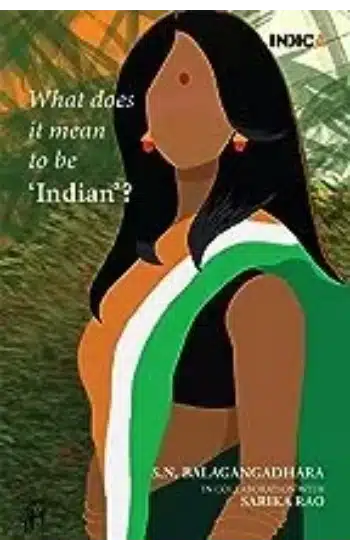
Save: 15%
What Does It Mean To Be ‘Indian’?
Publisher:
| Author:
| Language:
| Format:
₹470 ₹469
Save: 0%
In stock
Ships within:
In stock
| Weight | 430 g |
|---|---|
| Book Type |
ISBN:
Page Extent:
Why ask this question today? After all, a lot is written about India, her culture, her past, her society, the psychology and sociology of individuals and groups. Why is that not enough? It is because what we have learnt so far is either false or fragmentary. If Indian culture is not a slightly inferior, slightly idiosyncratic variant of Western culture, as the received view has it for a very long time, what else is it? Research into culture and cultural differences gives novel and surprising answers. Written for an intelligent but lay public, this book shares the results of 40 years of scientific investigations in the research programme Comparative Science of Cultures. It transcends the political distinction between ‘the right’ and ‘the left’ by looking deeper into ideas on human beings, society, culture, experience, the past, impact of colonialism etc. Today, the question ‘What does it mean to be ‘Indian’?’ is both important and difficult to answer. Is there something ‘Indian’ about this culture that goes beyond the differences between Hindus, Muslims, Christians, Sikhs or Jains? What does it überhaupt mean to belong to Indian culture?
1 review for What Does It Mean To Be ‘Indian’?
Clear filtersWhy ask this question today? After all, a lot is written about India, her culture, her past, her society, the psychology and sociology of individuals and groups. Why is that not enough? It is because what we have learnt so far is either false or fragmentary. If Indian culture is not a slightly inferior, slightly idiosyncratic variant of Western culture, as the received view has it for a very long time, what else is it? Research into culture and cultural differences gives novel and surprising answers. Written for an intelligent but lay public, this book shares the results of 40 years of scientific investigations in the research programme Comparative Science of Cultures. It transcends the political distinction between ‘the right’ and ‘the left’ by looking deeper into ideas on human beings, society, culture, experience, the past, impact of colonialism etc. Today, the question ‘What does it mean to be ‘Indian’?’ is both important and difficult to answer. Is there something ‘Indian’ about this culture that goes beyond the differences between Hindus, Muslims, Christians, Sikhs or Jains? What does it überhaupt mean to belong to Indian culture?
About Author
1 review for What Does It Mean To Be ‘Indian’?
Clear filtersVineet Kumar Singh –
Rated 5 out of 5The author of this book has a different level of intellect, which in turn seeks a higher level of intellect from the reader of this book. As the author has said in the beginning of this book that this book does not give answer to the question “What does it means to be Indian”? Rather, it gives an insight so that they engage themselves in seeking the answer. I have been reading quite a lot nowadays but till now I have not come across any book or article which has presented view like the author has on many aspects like Shivling pooja, Idol worship, God, polytheism, discrimination propaganda, temple entry for shudra, entry of women in certain temples, technicalities of words like ignorance, secularism, truth etc. All are like eye-opener.
Regarding secularism, I came to know about it from Sitaram Goel book, but here it has been explained more clearly. And it was shocking for me when the author says that “Social Science is not science in any sense but secularised Christian theologies”. Further it is confusing for me when author says that “there no such entity like Hinduism in the world outside the universities in the west and in the mind of Indologists”.
As it is said in the beginning, this book does not provide the answer to questions but same time prepares the reader so that he starts his journey in search of answers.
I request the readers to read this book 5-6 time then only we can do justice to the work of the author. An eye-opener book.



Vineet Kumar Singh –
The author of this book has a different level of intellect, which in turn seeks a higher level of intellect from the reader of this book. As the author has said in the beginning of this book that this book does not give answer to the question “What does it means to be Indian”? Rather, it gives an insight so that they engage themselves in seeking the answer. I have been reading quite a lot nowadays but till now I have not come across any book or article which has presented view like the author has on many aspects like Shivling pooja, Idol worship, God, polytheism, discrimination propaganda, temple entry for shudra, entry of women in certain temples, technicalities of words like ignorance, secularism, truth etc. All are like eye-opener.
Regarding secularism, I came to know about it from Sitaram Goel book, but here it has been explained more clearly. And it was shocking for me when the author says that “Social Science is not science in any sense but secularised Christian theologies”. Further it is confusing for me when author says that “there no such entity like Hinduism in the world outside the universities in the west and in the mind of Indologists”.
As it is said in the beginning, this book does not provide the answer to questions but same time prepares the reader so that he starts his journey in search of answers.
I request the readers to read this book 5-6 time then only we can do justice to the work of the author. An eye-opener book.